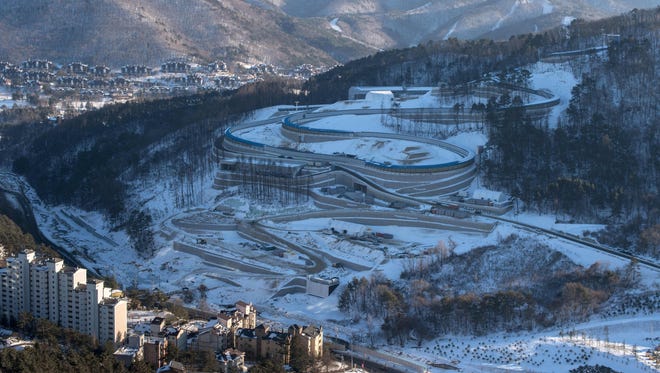Pyeongchang thinking big with one year to 2018 Winter Olympics
There is something about a secluded Olympic Games in a relatively small mountain town that sounds especially delightful in today’s bigger-must-be-better sports world.

The Winter Olympics always sneak up on us, coming so soon after the previous Summer Games. And so it is with the 2018 Olympics, which are now exactly one year away, being held in and around Pyeongchang, the smallest city (including the surrounding environs) to host an Olympic Games, summer or winter, since the 1994 Olympics in Lillehammer, Norway.
It takes three hours to get there by bus from Seoul’s Kimpo airport. A high-speed train, still under construction, will reduce that trip by more than an hour. From Seoul itself, the train to Pyeongchang will take just over an hour.
This area of less than 50,000 inhabitants, with a nearby city of 230,000 hosting the skating and hockey events, sounds quaint and faraway, but it still cannot escape the issues that roil the world.
MORE OLYMPICS COVERAGE:
Five questions one year out from Pyeongchang Olympics
Sports federations face obstacles in sanctioning Russian athletes
The Pyeongchang Games will be faced with some of the same pressing concerns that dogged the 2016 Summer Olympics in Rio: internal political turmoil and scandal, fears about a tumultuous global order, and, most specifically, Russia’s state-sponsored doping, and what to do about it.
On that point, Lee Hee-Beom, president and CEO of the Pyeongchang Organizing Committee, said during a recent interview that he believes Russia’s Winter Olympic athletes will be competing at the 2018 Games.
“With their renewed plan and actions, I think they can meet the (drug testing) criteria,” he said.
Since the interview, however, the world track and field federation extended its ban on Russian athletes, and Russian sports leaders continue to defend themselves and their system in the wake of investigations that have found that more than 1,000 elite Russian athletes participated in a massive, state-sponsored doping program.
That includes both summer and winter athletes; the doping test samples of 12 Russian medalists from the 2014 Sochi Olympics alone were tampered with, according to a World Anti-Doping Agency report.
Already there have been calls to ban Russian athletes from competing in Pyeongchang. One-third of Russia’s Summer Olympic delegation was not allowed to compete in Rio. One can only guess what will happen next in this ongoing and troubling saga.
Speaking of sagas, South Korean president Park Geun-hye has been impeached over a corruption scandal and has stepped aside while her case is being heard by a constitutional court. If this sounds familiar, it’s because Brazilian president Dilma Rousseff also was impeached and then removed from office before the Rio Games.

“I cannot say that these political issues are not affecting the Olympic Games, but we can manage it,” Lee said. “There might be some political change. We might have a presidential election in the near future. With a new president, no matter who becomes president, he or she has committed to supporting the Pyeongchang Olympic Games. There is no reason the Pyeongchang Olympic Games will be affected.”
A major concern of any Olympic organizing committee is what happens to its venues after its Games are over. To this end, Lee is vowing that there will be no “white elephants” after the 2018 Games, with private ownership stepping in to take over the venues. Ten of the 12 are already spoken for, he said, and he envisions a particularly rosey future for them because the next Winter Olympic Games will also be in Asia.
Lee said he is in conversations with organizers of the 2022 Beijing Winter Olympics about using the 2018 venues as training centers for athletes on their way to the 2022 Games.
He also envisions his Games as a launching pad of sorts, encouraging Asian children to get involved in winter sports.
"Winter sports were for the Europeans and for the Americans so far,” he said. “Winter sports are not so famous among young generations in Korea and in China. After 2018 and 2022, winter sports will become games for the Asians.”
Whether it be one year into the future, or five, this is the season for looking ahead.
PHOTOS: ONE YEAR TO GO UNTIL 2018 OLYMPICS
